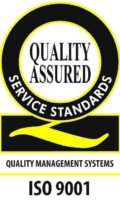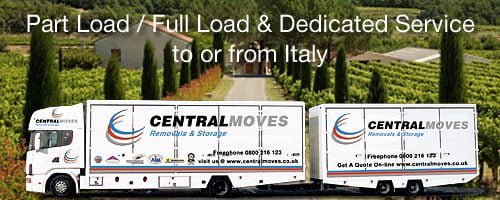Quality Assured Services






Get in Touch for a Free Moving Quote
Moving house or office to Italy from London
Italy is located in Southern Europe and comprises the boot-shaped Italian Peninsula and a number of islands including the two largest, Sicily and Sardinia.
Central Moves has just purchased a purpose built road train for Part loads into Italy from any property in England , Scotland, Wales & Ireland. Our professional European move Co-ordinators will oversee all aspects of your removals to Italy from beginning to end, all our move Co-ordinators have a true understanding of moving with-in Europe and worldwide and local knowledge for clients moving to Italy. We also have Italian speaking staff.
Italy Part Load Service
Our part load service to Italy is the perfect solution for clients who only have a small amount of effects to move. Offering a cheaper way of transporting your personal effects to your new home in Italy. This is a door to door removals service with loading and unloading completed by our crews.
Italy Full Load/Dedicated Vehicle Service
Our dedicated Italian removal service provides the client with sole use of 1 of our vehicles, meaning there will be no other customers effects on the vehicle. This service will be more expensive but you have more control over delivery dates in Italy. Our dedicated and part load removals service also includes the removal and disposal of used packing materials.
Services
We offer a wide range of services to make your move to Italy as smooth and stress-free as possible. These services include:
- Packing and unpacking
- Loading and unloading
- Transporting your belongings
- Visa and customs assistance
- Insurance
- Storage In the UK and Italy
Packing Services
When it comes to removals to Italy, our professional removals team offers comprehensive packing services to ensure a smooth and stress-free relocation experience. Our team of highly trained packers is skilled in handling a wide range of items, from fragile and delicate belongings to large furniture pieces. They utilise high-quality packing materials, including sturdy boxes, bubble wrap, and packing paper, to ensure maximum protection during transit.
Our packing services are tailored to meet your specific needs, whether you require full packing assistance or assistance with specific items. We carefully label and organise each box and make a full inventory of your possessions, making it easier for you to unpack and settle into your new home in Italy. With our packing services, you can have peace of mind knowing that your belongings will be expertly packed and transported to your new destination with the utmost care and attention to detail.
UK and Italy Furniture Storage
We offer long or short term furniture storage in the UK and Italy. Our clean and modern containerised storage facilities are all protected by CCTV and alarm systems, so you can rest assured that your belongings are safe.
In Italy, we work with a network of trusted partner removal companies to provide storage services in all regions of the country. We can help you find a storage facility that is close to your new home or business, and we can also arrange for the transportation of your belongings from storage to your new residence in Italy.
Benefits:
- Clean and modern containerised storage facilities
- CCTV and alarm systems for security
- Storage facilities in the UK and Italy
- Variety of storage packages to fit your needs
- Trusted partner removal companies in Italy
- Short or long term storage
- Onward delivery of your furniture from storage to your new residence
.
Testimonials
Here are some testimonials for removals to Italy from our past customers:
- “Central Moves made our move to Italy a breeze. The team was professional, efficient, and careful with our belongings. We would highly recommend them to anyone moving to Italy.” – John and Mary Smith
- “We were very impressed with the service provided by Central Moves. They were very helpful and accommodating, and they made sure that our move went smoothly.” – Susan and David Jones
Difficult access to your property
We can assist with difficult access in Italy by utilising our specialist vehicle that can also carry our small trans-ship vehicle and used at any destination. Central Moves also has network of Italian removals companies who can offer manpower and small vehicles for trans-shipment if required. We also hire outside elevators for those large items of furniture.
Central Moves can help with those very large items of furniture
In some properties it’s not possible to get your large items through the doorways or stairs. We can help you over come this problem when completing you removal to Italy with an outside elevator to take your items through your largest window.
We service all regions of Italy including Island destinations, Abruzzo, Basilicata, Calabria, Campania, Emilia-Romagna, Friuli-Venezia Giulia, Lazio, Liguria, Lombardy, Marche, Molise, Piedmont, Apulia (Puglia), Sardinia (Sardegna), Sicily (Sicilia), Tuscany (Toscana), Trentino-Alto Adige/South Tyrol (Trentino-Alto Adige/Südtirol), Umbria, Valle d’Aosta/Aosta Valley (Valle d’Aosta), Veneto. and offer weekly removals to all Italian cities as follows; Agrigento, Alessandria, Ancona, Andria, Aosta, Arezzo, Ascoli Piceno, Asti, Avellino, Bari, Barletta, Belluno, Benevento, Bergamo, Biella, Bologna, Bolzano, Brescia, Brindisi, Cagliari, Caltanissetta, Campobasso, Carbonia, Caserta, Catania, Catanzaro, Chieti, Como, Cosenza, Cremona, Crotone, Cuneo, Enna, Fermo, Ferrara, Firenze (Florence), Foggia, Forlì, Frosinone, Genova (Genoa), Gorizia, Grosseto, Imperia, Isernia, L’Aquila, La Spezia, Latina, Lecce, Lecco, Livorno, Lodi, Lucca, Macerata, Mantova (Mantua), Massa, Matera, Messina, Milano (Milan), Modena, Monza, Napoli (Naples), Novara, Nuoro, Oristano, Padova (Padua), Palermo, Parma, Pavia, Perugia, Pesaro, Pescara, Piacenza, Pisa, Pistoia, Pordenone, Potenza, Prato, Ragusa, Ravenna, Reggio Calabria, Reggio Emilia, Rieti, Rimini, Roma (Rome), Rovigo, Salerno, Sassari, Savona, Siena, Siracusa (Syracuse), Sondrio, Taranto, Teramo, Terni, Torino (Turin), Trapani, Trento, Treviso, Trieste, Udine, Varese, Venezia (Venice), Verbano-Cusio-Ossola, Vercelli, Verona, Vibo Valentia
Central Moves are one of the London’s top removal companies for Removals London to Italy who combine specialisation with our total commitment to providing a professional and personalised service, which this is why thousands of families and individuals have entrusted Central Moves with their Italian home removals, furniture removals and personal effects.
Here at Central Moves we pride ourselves in aiming to be the best Relocation Company to Italy .
Living & Working in Italy
If you are a British citizen or British subject with right of abode in the UK, you do not require a visa to enter Italy. Other British nationals should confirm the current entry requirements with their nearest Italian embassy.
A valid British passport must be held for entry to and exit from Italy. There is no minimum passport validity requirement but you should ensure that your passport is valid for the duration of your visit.
Italian residence permit
Under EU directives, you may remain in Italy for a maximum of 3 months, by providing the nearest police station with a declaration of presence on Italian territory (dichiarazione di presenza sul territory nazionale) . If you intend to remain for a period exceeding 3 months or moving to the country on a permanent basis, you must apply to your nearest town hall (Comune-Ufficio Anagrafe ) for residency (iscrizione anagrafica). You will be issued with a certificate (attestato d’iscrizione anagrafica), which is valid for 5 years from the date of issue, or for your period of intended residency (if this is less than 5 years). After 5 years EU nationals can request permanent residency (attestazione di soggiorno permanent).
Accessing healthcare in Italy
If you’re receiving a UK state pension, or in receipt of long-term in capacity benefit, you may be entitled to state healthcare paid for by the UK. You will need to apply for an E121, which you should then present to the Italian health authorities.
However, if you move to Italy to live but not work and do not receive a UK benefit, you may be eligible for up to two-and-a-half years of state healthcare cover, paid for by the UK. In this case, you will need to apply for an E106.
How to register your E121 or E106
In both cases, you will need to contact your local ASL office. Additionally, you might be asked to provide a copy of the original E121/ E106 and a proof of identity.
The staff at Central Moves are more than happy to offer free advice on removals to Italy including all customs formalities, contact us today.
Property In Italy
Property can be an attractive investment option, whether you’re considering purchasing a holiday home, a retirement property, or an investment property. Here are some key points to know about property in Italy:
- Property Types: the country offers a diverse range of properties, including apartments, villas, country houses (casali), and historic properties like farmhouses or palazzos. The availability and types of properties vary by region and city.
- Buying Process: The process of buying property involves several steps. It’s advisable to engage the services of a qualified real estate agent (agente immobiliare) and a notary (notaio) who can guide you through the legal and administrative procedures. It’s important to conduct thorough due diligence, including verifying property ownership, permits, and any potential issues.
- Costs and Taxes: When purchasing property in Italy, you should factor in additional costs and taxes. These may include real estate agent fees (around 3% to 8% of the property value), notary fees (around 1% to 3% of the property value), and government taxes, such as registration tax (imposta di registro) and value-added tax (VAT). It’s essential to understand the applicable tax regulations, which can vary depending on whether you’re a resident or non-resident.
- Foreign Ownership: Non-residents can freely purchase Italian property without restrictions. However, certain areas may have restrictions on property purchases by non-EU citizens. It’s advisable to consult with professionals to understand any specific regulations or limitations in the region you’re interested in.
- Property Market: The Italian property market can vary across regions. Popular areas like Tuscany, Umbria, Liguria, and the Amalfi Coast tend to have higher property prices due to their attractiveness to tourists and foreign buyers. In contrast, some rural or less touristy regions may offer more affordable options.
- Renovation and Restoring Properties: Italy has a wealth of historic properties that may require renovation or restoration. While this can be an opportunity to own a unique property, it’s important to consider the costs and potential challenges associated with such projects, including permits, contractors, and adherence to local regulations.
- Rental Income: If you’re considering purchasing a property for investment purposes, Italy’s popularity as a tourist destination can make it an attractive market for holiday rentals. However, it’s essential to familiarise yourself with local regulations and any requirements for renting out properties to tourists.
It’s highly recommended to seek professional advice from local experts, including real estate agents, lawyers, and accountants, to navigate the property market and understand the legal and financial implications of purchasing property in Italy. They can provide guidance tailored to your specific needs and circumstances.
Schools in Italy
- Scuola dell’Infanzia (Nursery School/Kindergarten): This is the first level of education in Italy, generally attended by children aged 3 to 5.
- Scuola Primaria (Primary School): Also known as Scuola Elementare, this is the mandatory level of education for children aged 6 to 11. It comprises five years of study.
- Scuola Secondaria di Primo Grado (Lower Secondary School): Commonly referred to as Scuola Media, this level of education is attended by students aged 11 to 14. It consists of three years of study.
- Scuola Secondaria di Secondo Grado (Upper Secondary School): This level of education is divided into different types of schools:a. Liceo (Academic High School): Offers a general education curriculum and prepares students for university. There are various types of Liceo, such as Liceo Classico (Classical High School), Liceo Scientifico (Scientific High School), Liceo Linguistico (Linguistic High School), and more.b. Istituto Tecnico (Technical Institute): Focuses on technical and vocational subjects, providing practical skills and preparing students for the job market.c. Istituto Professionale (Professional Institute): Offers vocational education and training in various fields, such as mechanics, electronics, hospitality, and more.d. Istituto d’Arte (Art Institute): Specializes in artistic education, including visual arts, design, and other creative disciplines.
- Università (University): Italy has numerous universities offering undergraduate and postgraduate degrees across various disciplines. Some of the well-known universities include the University of Bologna, Sapienza University of Rome, University of Milan, and Politecnico di Milano.
It’s important to note that there are also private schools in Italy, which may follow different educational models or philosophies. Additionally, Italy has international schools that cater to expatriate communities and offer education in different languages
Food In Italy
Italy is renowned for its diverse and delicious cuisine, which varies by region but shares common themes of fresh ingredients, simplicity, and rich flavours. Here are some popular Italian dishes and food items:
- Pasta: Italy is famous for its pasta dishes, which come in numerous shapes and sizes. Some classic pasta dishes include spaghetti alla carbonara, fettuccine Alfredo, lasagna, and ravioli.
- Pizza: Originating from Naples, pizza has become a beloved Italian export. Traditional Neapolitan pizza features a thin crust topped with tomato sauce, mozzarella cheese, and various toppings like basil, olives, or cured meats.
- Risotto: This creamy rice dish is cooked slowly with broth until it reaches a rich, velvety consistency. Risotto alla Milanese, made with saffron and Parmesan cheese, is a popular variation.
- Antipasti: Antipasti are appetizers or small bites that can include a variety of cured meats (such as prosciutto or salami), cheeses (like mozzarella or pecorino), marinated vegetables, bruschetta, and olives.
- Gelato: Gelato is Italy’s beloved frozen dessert, similar to ice cream but denser and creamier. It comes in a wide array of flavours, from classics like chocolate and vanilla to unique creations like pistachio or stracciatella (chocolate chip).
- Espresso and Cappuccino: Italy is known for its coffee culture, and espresso is a staple. Italians often enjoy a quick shot of strong espresso after a meal. Cappuccino, a combination of espresso, steamed milk, and milk foam, is a popular morning choice but is less commonly consumed after breakfast.
- Tiramisu: This delectable dessert consists of layers of ladyfingers soaked in coffee and liqueur, layered with sweetened mascarpone cheese, and dusted with cocoa powder. It’s a classic Italian treat.
- Caprese Salad: A simple yet delicious salad, Caprese consists of fresh mozzarella cheese, tomatoes, and basil leaves, drizzled with olive oil and balsamic vinegar. It represents the colours of the Italian flag.
- Ossobuco: Hailing from Milan, ossobuco is a slow-cooked dish made with braised veal shanks, typically served with gremolata (a mixture of lemon zest, garlic, and parsley) and risotto alla Milanese.
- Pesto: Originating from Liguria, pesto is a sauce made from fresh basil leaves, pine nuts, garlic, Parmesan cheese, and olive oil. It’s commonly tossed with pasta or used as a spread.
Italian cuisine is incredibly diverse and varies greatly from region to region, with each area showcasing its own specialties and local ingredients.
Italian Culture
Italian culture is rich and diverse, encompassing art, music, literature, architecture, fashion, cuisine, and a strong sense of community. Here are some key aspects of Italian culture:
- Art and Architecture: There is long history of Italian artistic excellence, with contributions from famous figures like Leonardo da Vinci, Michelangelo, and Botticelli. Italian cities are home to magnificent architecture, such as the Colosseum in Rome, the Duomo in Florence, and the canals of Venice.
- Music: Italy has had a significant influence on classical music, opera, and popular music. Opera originated in Italy, with composers like Verdi, Puccini, and Rossini leaving a lasting legacy. Italy is also known for its traditional folk music, such as tarantella, and modern music genres like pop, rock, and hip-hop.
- Literature: Italy has a rich literary heritage, with renowned authors like Dante Alighieri (known for “The Divine Comedy”), Petrarch, and Italo Calvino. Italian literature has contributed to world literature through works in various genres, including poetry, prose, and drama.
- Fashion: Internationally recognized as a hub of fashion and design. Italian fashion houses, such as Gucci, Prada, Armani, and Versace, are renowned for their craftsmanship and style. Cities like Milan are known for hosting major fashion events and being centres of haute couture.
- Cuisine: Italian cuisine is celebrated worldwide for its flavours and diversity. It is characterized by the use of fresh, seasonal ingredients and simple preparations. Italian dishes like pasta, pizza, risotto, gelato, and espresso are loved globally. Each region has its own culinary specialties and traditional recipes.
- Festivals and Celebrations: Italy is known for its vibrant festivals and celebrations, which often have historical and religious significance. Examples include the Venice Carnival, the Palio di Siena horse race, the Festa della Repubblica (Republic Day), and religious processions like the Feast of Saint Mark in Venice or the Feast of Saint Joseph in Sicily.
- Family and Community: Family plays a central role in Italian culture. Strong family ties, respect for elders, and close-knit communities are valued. Italians often gather for meals and socialize together, reinforcing a sense of community and shared experiences.
- Passion for Football (Soccer): Football is the most popular sport in Italy, and the national team has a strong following. Italian football clubs, such as Juventus, AC Milan, and Inter Milan, have achieved great success and have passionate fan bases.
- Gestures and Expressiveness: Italians are known for their expressive communication style and the use of hand gestures to emphasize their point. Gestures like the “hand purse” or the “Italian chin flick” are commonly used in conversations.
Italian culture is deeply rooted in history and tradition, yet it continues to evolve and influence global trends in various fields.
Customs Information
Please note our European move Co-ordinators are fully versed with all customs formalities and will offer help and advice including the completion of the required paperwork for customs prior to your move to Italy. We have customs clearance agents in the UK and Italy to make the process as seamless as possible.
Documents Required To Move To Italy
- Copy of passport
- Original bill of lading (OBL) / air waybill (AWB)
- Copy of tax code number / Codice Fiscale from the Agenzia delle Entrate
- Packing list in English or Italian
- Diplomatic franchise / telepresso addressed to the Italian Ministry of Foreign Affairs, issued by the owner of the goods’ diplomatic organization (Diplomats)
- Customs Dichiarazione Sostitutiva di Certificazione, completed and signed by owner of the goods
- Detailed inventory signed by owner of the goods, stamped and signed by Italian Consulate / Embassy at origin and attached to the Dichiarazione Consolare di Rimpatrio (citizens, EU nationals)
- Permit to stay released by the Questura Police Office (non-Diplomats)
- Copy of residence certificate / receipt from Italian City Hall stating the owner of the goods has requested residence registration (non-Diplomats)
- Original consular declaration / Dichiarazione Consolare di Rimpatrio released by the Italian Consulate / Embassy (Italian citizens)
Specific Information
- The Dichiarazione Sostitutiva di Certificazione must include the following information:
- Number of family members
- City of nationality
- Country of origin from which the owner of the goods is transferring residence
- Date of establishing residency in Italy
- The Consular Declaration / Dichiarazione Consolare di Rimpatrio must include the following information:
- Period of time the owner of the goods was a resident abroad (must be a minimum of 12 months)
- Names of family members and the date of the owner of the goods’ definitive return to Italy
- Packing list
- The authorization to import new furniture must be obtained for clearing Customs by paying duties and value added tax (VAT).
- For new furniture, duties are subject to change depending on the material of the furniture.
- VAT is 22% on the CIF value of the shipment.
- The owner of the goods has 6 months from the date of establishing residency in Italy to import the household goods shipment duty and tax free (non-Diplomat / national citizens of a non-EU Country).
- The owner of the goods has 1 year from the date of departure from the origin country to import the household goods shipment duty and tax free (citizens / EU nations).
- Diplomats can apply for the entry permit / franchise issued by the Ministry of Foreign Affairs only after they have started working for the diplomatic organization in Italy.
- In order to avoid extra fees at the port / airport, transportation should be put on hold until given the green light by the destination agent in Italy.
- It is strongly recommended that Italian citizens obtain a consular certificate as soon as possible to expedite the Customs process (citizens / EU nationals).
- A detailed list including an accurate description of art pieces and antiques is required.
- A legalization of the list from the Italian Consulate at origin is advisable.
Source: IAM Movers Italy Customs
Our European removals team at Central Moves will assist you with the processing and completion of all customs formalities.
















